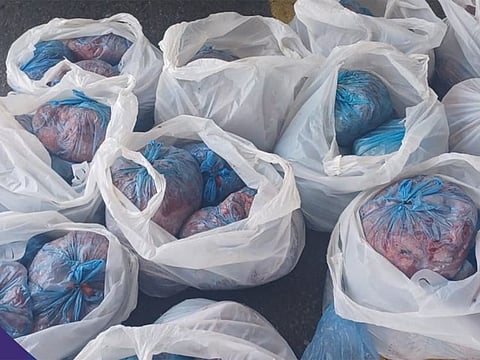Saudi Arabia: Large quantity of rotten sacrificial meat seized in Jeddah
Over 454,000 livestock offered for sacrifice via Saudi abattoirs during Eid

Cairo: Authorities in the Saudi port city of Jeddah foiled attempts to smuggle large quantities of sacrificial meat unfit for human consumption during last week's Muslim Eid Al Adha.
Municipal authorities uncovered the smuggling of rotten meat from 1,243 sacrificial animals at five checkpoints and impounded 109 vehicles involved in the illegal and unhealthy transport of the meat, which failed to comply with preservation and storage rules.
The Jeddah mayoralty said that monitoring teams, with support from security agencies, seized and confiscated the spoiled meat.
The number of sacrificial animals handled by abattoirs across the kingdom during the first three days of Eid Al Adha reached 454,620 heads of cattle, according to the Saudi Ministry of Environment, Water and Agriculture.
The city of Mecca, home to Islam's holiest mosque, took the lead in the numbers of sacrificial animals with its abattoirs handling 183,717 heads of cattle, mainly on the first day of the Eid that fell on Sunday this year.
Riyadh came second with 106,970 heads of cattle, followed by Medina, home to Islam's second holiest site, with 39,428, according to a breakdown from the ministry. Slaughterhouses handled 35,377 livestock in the Eastern Province and 16,782 more heads of cattle in the Central Province of Al Qassim during the same period.
During Eid Al Adha or the Feast of Sacrifice, Muslims, who can afford it, sacrifice animals such as sheep, goats, camels and cows, honouring the Prophet Ebrahim’s willingness to slay his son Ismael at Allah’s command. As the Prophet Ebrahim and Ismael showed unwavering obedience to the divine order, Allah sent a ram slaughtered in the son’s stead.
Sign up for the Daily Briefing
Get the latest news and updates straight to your inbox



